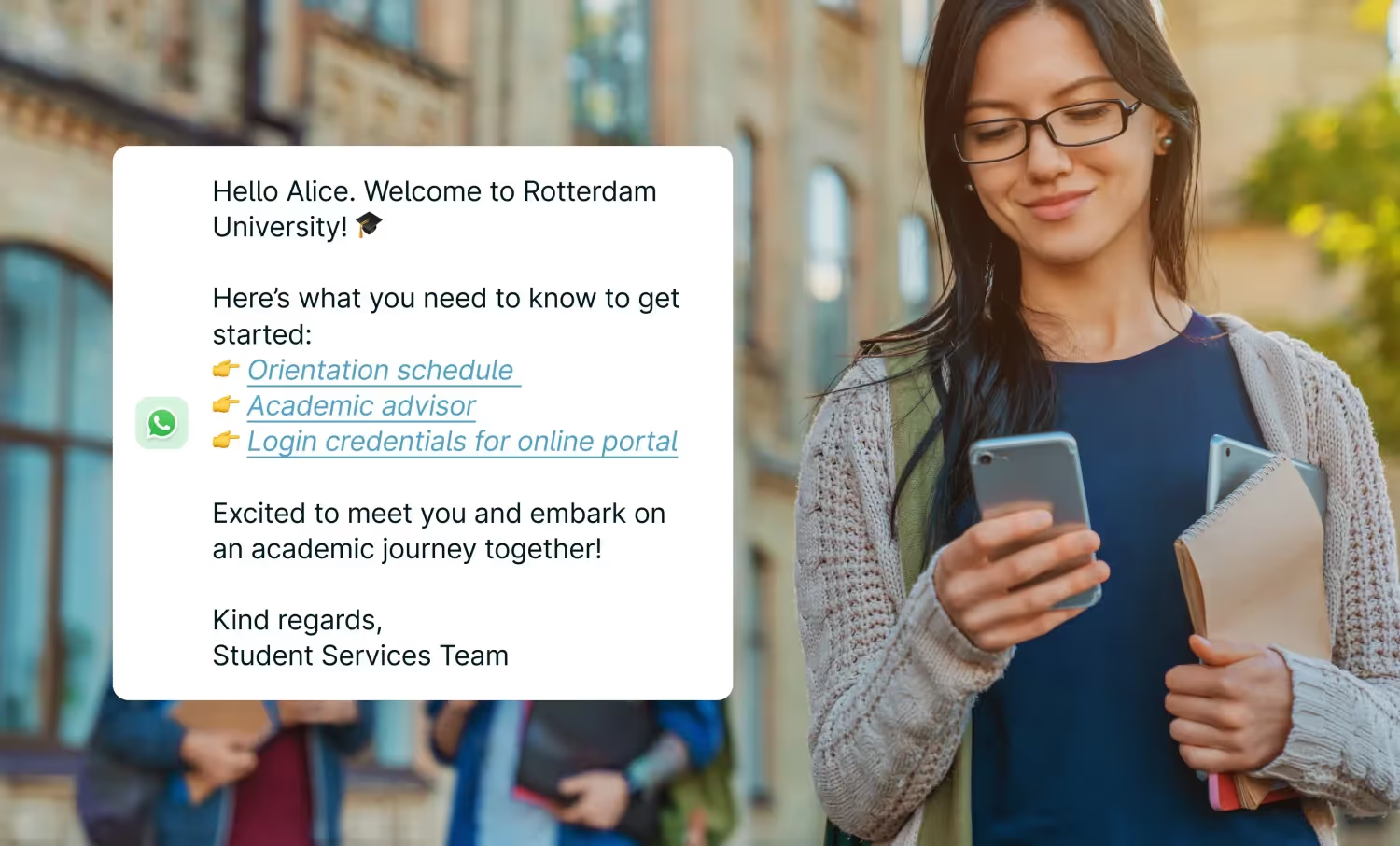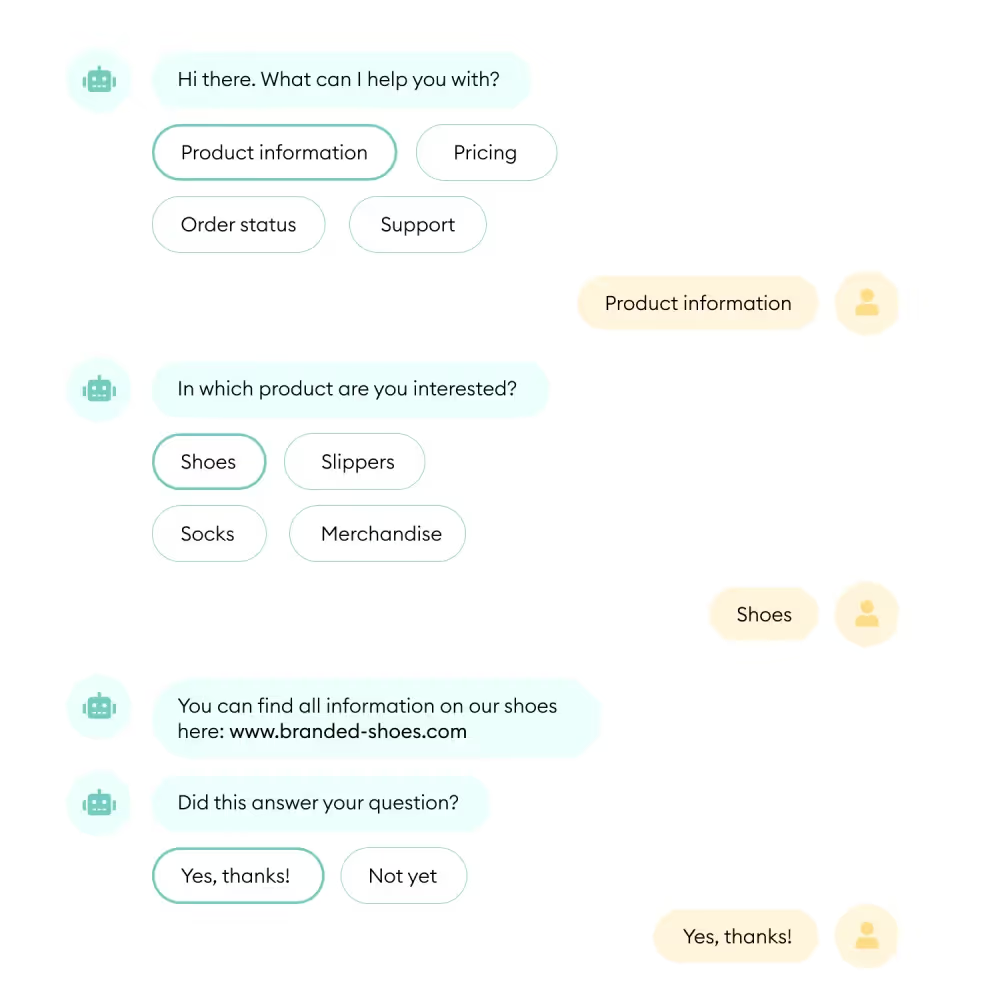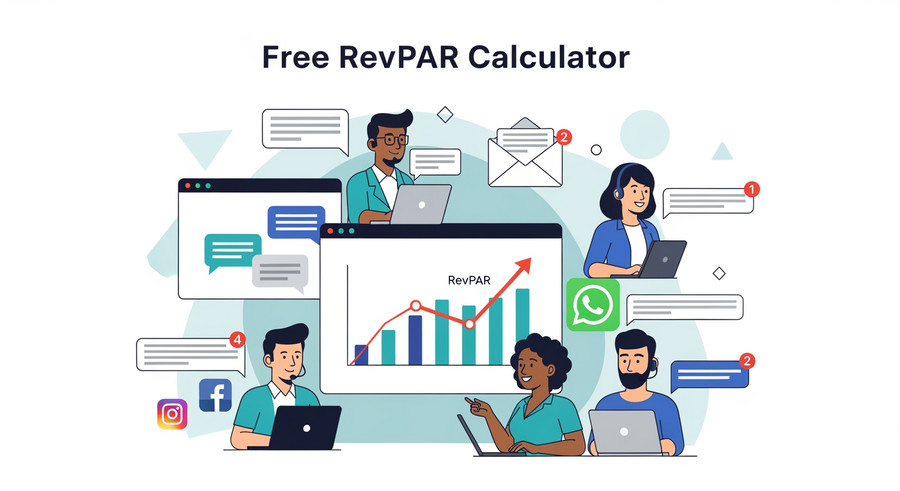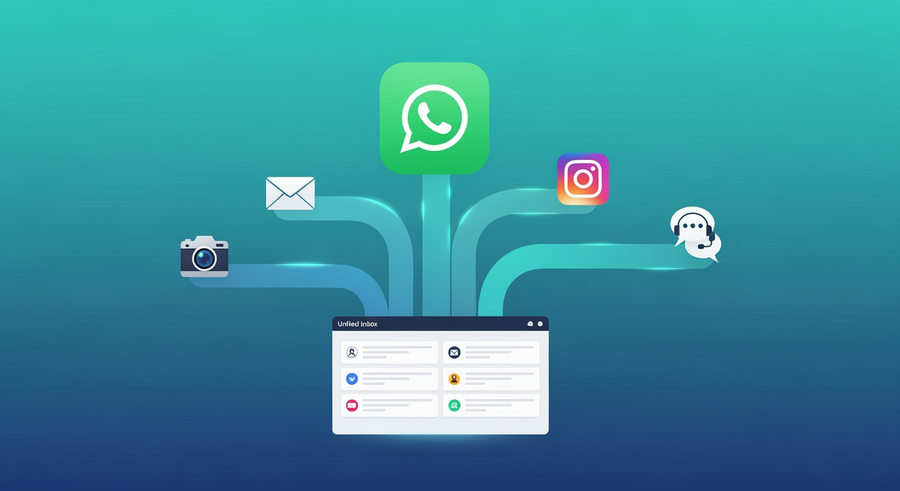Aside from being the world’s third most used social media platform with 2.4 billion active users, WhatsApp helps users send 100 billion messages daily.
In fact, one would argue it’s a household name as it’s the default messaging platform for more than 25 countries, including Brazil, India, Italy, the Philippines, the US, and many other African countries.
With this level of penetration and influence on the personal communication level, it’s no surprise that more and more schools have started adopting WhatsApp Business to communicate with their students.
And this is coupled with the fact that many students — especially young ones- prefer instant messaging apps like WhatsApp over email.
If you’re considering using WhatsApp for your school, here’s all you need to know.
What are the benefits of using WhatsApp for education?
Real-time interactions via broadcast message feature
One of the core capabilities of WhatsApp is its broadcast messaging feature. This can facilitate a quick and easy communication path between students and teachers.
A relatable scenario would be a teacher adding all their students to a broadcast list. This way, when the teacher sends one message to the entire class, the entire class, each student receives it as a personal message.
📚Related →How to send a WhatsApp Business broadcast message.
Multimedia sharing capabilities
Sharing photos, videos, documents, and audio files are some of the multimedia sharing capabilities of WhatsApp. All of this can be helpful for students and teachers to share presentations, study materials, recordings, and sharing class materials.
For instance, if some students are absent from class due to personal reasons, the teacher can record the lecture and share it with the class. This can even help make the learning experience more engaging and interactive, as students can watch the lecture at their own pace and revisit it whenever they need to.
📚Related → Top 10 benefits of using WhatsApp Business in 2023
What are some practical use cases for WhatsApp in education?
School application process
Due to the influx of students registering and applying to your school, having a proper overview of each applicant can often be a tasking, and time-consuming process.
Meanwhile, with WhatsApp, you can streamline and manage the entire application process to help improve the overall experience for the school and the applicant.
For instance, schools can use WhatsApp to send notifications to applicants about the status of their application, such as when it has been received, when it is being reviewed, and when a decision has been made.
Here’s a template you can customise to fit your needs:
“Dear {{applicant_name}},
Applications for the upcoming academic year at {{school_name}} are now open! To apply, please:
→Visit {{school’s_website}} to learn about our programs
→Fill out the online application form and submit it
Fill out the online application form and submit it
Contact us on WhatsApp if you have questions about the application process. We look forward to receiving your application!
Best regards,
The Admissions Team at {{school_name}}”
This can help applicants stay informed and reduce their anxiety about the application process. Some other ways schools can use WhatsApp include:
- Providing information to applicants
Use WhatsApp to create a group or broadcast list to update applicants about their application process, admission requirements, deadlines, and other important details. This will help applicants have instant and easy access to all the required information at all times — and in one place.
- Collecting documents
Using WhatsApp, applicants can send all their transcripts, test scores, and letters of recommendation without needing to be physically present at the school. This will save the time and resources of both the school and the applicant.
“Hello {{applicant’s_name}},
Thank you for applying to {{school’s_name}}! We're excited to review your application.
Please send us the following documents via WhatsApp:
→Academic transcripts
→Identification documents
We guarantee the utmost confidentiality of all documents.
If you have any questions, please reach out to us on WhatsApp.
Best regards,
The Admissions Team at {{school”s_name}}”
- Conducting interviews
Schools can use video and voice-call options on WhatsApp to simplify the applicant interview process for schools — especially for those unable to attend in-person interviews.
"Dear {{applicant’s_name}},
Thank you for your application to {{school’s_name}}!
We are impressed and would like to invite you for a 10-minute WhatsApp video call interview on {{date}} at {{time}}.
Please let us know if you have any scheduling conflicts.
For any questions, please contact us on WhatsApp.
We look forward to speaking with you soon!
Best regards,
The Admissions Team at {{school’s_name}}"
Student onboarding
With new students in the school system, getting them acclimated to the environment is important. And one way to do this is by using WhatsApp to provide them with all the necessary materials to aid their onboarding process. Some of these include:
- Welcoming messages
The head of the department or school can send a welcoming message to all new students to make them feel welcome and part of the school system. This message can include an image or video showing the school’s facilities and amenities. It can also cover introducing students to their respective teachers, staff members — and even other students.

- Orientation information
New students can use WhatsApp to get information about their classes, orientation schedules, and other important events. Other materials, such as school maps, can also be shared through WhatsApp for new students to navigate the school environment more easily.
"Hello {{student’s_name}},
Welcome to {{school_name}}! Here are some important things you need to know:
→Our academic programs and curriculum
→Our campus map and facilities
→Our student services and support resources
We will have an orientation program that will provide more in-depth information about our school and resources. It will be on {{date}} at {{time}}.
If you have any questions, don't hesitate to reach out to us on WhatsApp.
We can't wait to meet you and start this exciting academic journey together!
Best regards,
The Student Services Team at {{school_name}}."
- Mentorship programs
Schools can use WhatsApp to connect new students to older students or staff members who can help them adjust to the new environment. Mentors can answer new students' questions and provide them with the required support during the onboarding process. This can ultimately help new students feel more connected to the school community and increase their likelihood of success.
“Hello {{student’s_name}},
As a new student at {{school’s_name}}, we offer a mentorship program that connects you with an experienced student mentor who can provide guidance throughout your academic journey.
Our mentorship program offers:
→Personalised support and advice from an experienced student mentor
→Guidance on navigating the academic environment
To participate, fill out the application form at {{website}}.
We will match you with a mentor who shares your academic interests and career goals.
Kind regards,
The Mentorship Program Team at {{school_name}}”
Providing support, FAQs and collecting feedback on student-related issues
During students’ application and onboarding processes, most students would likely run into some academic-related issues such as accommodation, class schedules, finances— and even health issues. All of which would require administrative support — especially for new applicants.
A good approach would be for schools to have a dedicated WhatsApp account for applicant support. With this, it’s easier for schools to respond to inquiries in real time, providing personalised support throughout the application process. This can help applicants feel more supported and increase their likelihood of completing the application process.
Some other ways to address these issues in order to streamline your school’s support system include:
- Automated messages
You can use the WhatsApp Business API to set up automated messages that respond to students’ frequently asked questions. These messages would provide detailed information about the admission procedures, course schedules, fee structures — or any other queries related to the school and its processes. These automated messages can be done via a chatbot and triggered using keywords or phrases that students may use in their messages.
💡Pro Tip → You can integrate Trengo’s chatbot option with your WhatsApp Business via the API. With this, you can automate students’ FAQs, the application process, enrollment, timetable and schedules, application status, etc.
By automating these tasks with a WhatsApp chatbot, schools can improve the efficiency of their operations, reduce workload, and provide students with a more seamless experience.
“Hello! I'm {{chatbot_name}}, the {{school_name}} chatbot. Here are some common questions I can help with:
- How do I apply?
- What are the admission requirements?
- What is the tuition fee?
- What programs does {{school_name}} offer?
- What are the campus facilities and resources available?
Just type the number of the question you have and I'll provide you with relevant information. If you need further assistance, I can connect you with a human representative.
Thanks for contacting {{school_name}}'s chatbot! We're here to help!
Best regards,
{{school_name}} Support Team”
So, for example, if a student responds with number {{7}}, the chatbot auto-responds with the following:
To check the course schedules for {{school_name}}, log into your student portal at {{website_address}}. You'll find a list of all your registered courses, along with the dates and locations. If you have any more questions, just ask and I'll provide the information you need. For further assistance, a human representative from the student support team can help. Thank you for contacting us.
Best regards,
Student Support Team
⭐️Recommended → How to build a WhatsApp chatbot (100% no code)
- Personalised messages
Another way you can use WhatsApp to provide support is by personalising interactions with students to address their individual concerns or issues. For instance, if a student has a question about an academic-related issue, they can easily message the school’s phone number. And the chatbot can ask them basic questions such as their name, department, and identification number to help connect them to the right person. Once connected, the staff member can respond with a personalised message addressing the student’s specific concerns.
- Notifications
Another form of support is schools using WhatsApp to send notifications about upcoming deadlines, events, and reminders. For example, schools can send an auto-reminder about application deadlines and exam schedules depending on the urgency and relevance of the information being shared.
“Dear students,
We hope this message finds you well. We would like to remind you of the upcoming deadlines:
→Application deadline for the upcoming academic year: {{date}}
→Final exam schedules for the current semester: {{date}}
→Graduation ceremony details: {{date}}
Congratulations to all the graduating students! Please review the details of the graduation ceremony and make sure to attend to receive your diploma.
If you have any questions or concerns, please contact us.
Best regards,
{{school_name}}”
💡Pro Tip → Set up the WhatsApp Business API via Trengo to enable the WhatsApp broadcast feature that allows you to send push notifications to multiple contacts simultaneously.
- Feedback collection
Schools can also use WhatsApp to collect feedback from students regarding their experience at the school. For instance, schools can send surveys to students through WhatsApp to get feedback on the quality of education, faculty, facilities, and other aspects of the school. This feedback can help schools identify areas for improvement and make changes to better meet the needs of their students.
“Dear students,
Please tell us about your experience at {{school_name}}. Your feedback will help us improve our services.
"1. How satisfied were you with {{school_name}}?
→Satisfied
→Neutral
→Dissatisfied
2. What did you like most/least about your experience at {{school_name}}?
3. How likely are you to recommend {{school_name}} to a friend or colleague?
→Very likely
→Neutral
→Very unlikely
Thank you for your feedback! Your input is important to us.
Best regards,
{{school_name}}.”
💡Recommended Case Study → How Rotterdam University offers student support with Trengo's Flowbot
Assessing student’s learning progress
The assessment of each student's academic performance is critical in determining their grades. This assessment is usually based on a combination of factors, such as class participation, homework, assignments, quizzes, tests, and exams. All of these are used by teachers to evaluate each student's understanding of the material being taught and to gauge their overall progress in the course.
In most cases, the grades received from these assessments are recorded in the student's academic record and are used to determine their eligibility for progression to the next level or for graduation. Therefore, it is important for both students and teachers to take these assessments seriously, and for schools to provide appropriate resources and support to ensure that each student has the opportunity to excel.
Here are some examples of assessment activities that can be done through WhatsApp:
- Quizzes
Teachers can create a multiple-choice quiz and send it to their students. Students can then respond to the quiz through WhatsApp by selecting the appropriate answer or typing in a response and seeing their answers in real time. This quick turnaround time allows teachers to provide immediate feedback to students, which can help them identify areas where they may be struggling and provide support where needed.
“Dear students,
As part of our class today, please take this short quiz to test your understanding of the material we've covered so far:
1. {{Question}}?
→Option A
→Option B
→Option C
→Option D
2. {{Question}}?
→Option A
→Option B
→Option C
→Option D
3. {{Question}}?
→Option A
→Option B
→Option C
→Option D
Please reply with the number of the option you think is correct for each question. Once you've submitted your answers, I'll review them and give feedback.
Good luck!
Best regards,
{{Teacher’s_name}}”
💡Pro Tip → Instead of typing out the answers for each question, you can use Trengo’s flowbot feature to simulate conversations with every student that opts in for the quiz.

- Online exams
For schools with students located in different parts of the world, WhatsApp can be practically useful when conducting online exams. Teachers can send exam questions to students via WhatsApp in the form of text, images, or PDF documents. These questions can be customised to test different aspects of the students' knowledge, such as their recall, comprehension, analysis, or synthesis of information.
- Peer reviews
Using WhatsApp for peer reviews can help students develop their critical thinking skills, improve their writing abilities, and enhance their overall learning experience. A quick example of how this could work would be setting up a WhatsApp group where teachers assign writing tasks to all participating students. Then the students share their work and allow other students to read and review their work. During this review, students can provide constructive feedback and also point out areas for improvement. This can also be done anonymously to encourage honest feedback.
- Attendance management
Another WhatsApp use case in ensuring students are paying attention in class and also learning as much as possible is by actively keeping tabs on students' attendance.
Schools can create an attendance management system that is automated to send daily reminders to students and all their responses tracked and updated daily.
“Dear {{student_name}},
Please mark your attendance for today's class by replying with one of the options below:
1. Present
2. Absent
3. Late
Thank you for your cooperation.
Best regards,
{{school Name}}”
Parent-teacher communication
One important aspect of education that can significantly impact a student’s success and performance is parent-teacher communication. With WhatsApp, parents can stay updated on their child’s progress and get answers to any questions they may have.
For instance, teachers can use WhatsApp to share students’ grades, attendance, and behaviour in school. They can also use that to provide feedback on assignments, and exams, and also share resources and strategies for helping the child succeed.
And parents can use WhatsApp to communicate with teachers in sharing any concerns they may have about their child’s academic or personal life. They can also use this to ask questions about the homework, curriculum, and upcoming exams, and receive updates on school events and activities. All of this facilitates open and ongoing communication between parents and teachers.
- Homework assignments
Teachers can use WhatsApp to send homework assignments to parents — especially for younger students who may need more parental supervision. This is to ensure that the child completes the assignments in due time, and has enough time to ask questions if need be.
“Dear {{Parent _name}},
This is to inform you that your child has homework due on {{Date/Day}}.
The assignment is related to {{Subject/Topic}} and should be completed by {{Time}}.
Please make sure that your child completes the assignment on time and reviews it before submission.
If you have any questions, please don't hesitate to contact me.
Thank you,
{{Teacher's Name}}”
- Parent-teacher conferences
Schools can utilize WhatsApp in scheduling parent-teacher conferences.
In this case, the teacher shares their availability and the parents respond with their preferred slot — hence, saving the time and back-and-forth between both parties.
"Dear {{Parent Name}},
Hope you're doing well.
I would like to schedule a parent-teacher conference to discuss your child's academic progress.
I have the following dates and times available: {{List available dates and times}}.
Please let me know which date and time work best for you, and I will schedule the appointment accordingly.
Thank you,
{{Teacher's Name}}"
Why is the WhatsApp Business API better for education management in schools?
The usefulness and versatility of a WhatsApp Business cannot be argued as its one of the best solutions for businesses to communicate with their customers.
However, it may not be the best choice for education management. The initial design of the WhatsApp Business account was aimed at helping small businesses manage their customer interactions. As such, it doesn’t have all the necessary features required for managing education-related tasks.
The WhatsApp Business API provides a more robust set of features that position it as a solution that’s better suited for education management.
Some of the features include:
- Customised messaging. With the WhatsApp Business API, schools can send personalised templated messages to students and parents about assignments, exam schedules, and other educational activities.
- Security and compliance
- In terms of security, the WhatsApp Business API provides end-to-end encryption and two-factor authentication. This is important for schools that need to protect sensitive student, parent and staff information.
- Regarding compliance, WhatsApp Business API also complies with major data protection laws such as the GDPR.
- Easy integration with existing systems like your CRM (customer relationship management) or student information systems, to streamline communication and data management.
- Scalability. The WhatsApp Business API is designed to handle a large volume of messages making it a suitable solution for schools with hundreds or even thousands of students.
- Rich analytics and reporting allow schools to track important metrics such as open rates, message delivery rates, and click-through rates, so they know which areas to improve accordingly.
Internal collaboration. Manage one WhatsApp number with an unlimited number of users (the WhatsApp business app has a limit of 4.)
📚Related → 5 WhatsApp Business API use cases
How to set up the WhatsApp Business API for education management
Once you have your WhatsApp Business account up and running, next is to apply for the WhatsApp Business API.
The WhatsApp Business API serves as a distinct interface for large organizations — like schools to communicate with students and staff at scale.
Think of all you could do with your normal WhatsApp and WhatsApp Business — but better, faster, and more secure.
All you have to do is use a customer engagement platform like Trengo to gain access to the API and that takes about 15 minutes tops (you’ll be done in 10 — we promise 😉).
WhatsApp for education management can be better — with Trengo
Running a school’s education management system has a lot of moving parts that can be quite hassling. For example, a typical school’s database would comprise detailed information about students, teachers, parents, and other core data — all of which have to be updated regularly. This alone is time-consuming, hassling, and overall difficult to pull off.
But then comes Trengo to save the day.
Trengo is a customer engagement platform that allows teams like yours to manage communication effectively across different channels such as email, social media and WhatsApp among others.
With the WhatsApp Business API and Trengo fully integrated, you can handle and automate student inquiries, schedules, and attendance, give assignments, manage course materials, and communicate with new, old, and returning students and their parents.
Think about it— with Trengo, your school’s WhatsApp messages can be managed more efficiently, allowing for quicker responses and a seamless flow of interaction.
Start a free demo
Frequently asked questions
Is a WhatsApp chatbot suitable for both small schools and large universities?
Yes, WhatsApp chatbots are suitable for educational institutions of all sizes. Small schools can use chatbots to automate routine enquiries and communications efficiently, while large universities benefit from chatbots handling high volumes of student interactions such as admissions, schedules, and support. Platforms like Trengo enable scalable chatbot solutions that adapt to the size and needs of your institution.
How do I build or deploy a WhatsApp chatbot for my educational institution?
To build or deploy a WhatsApp chatbot, start by identifying key communication needs such as admissions or class updates. Choose a platform like Trengo that supports WhatsApp Business API integration, allowing you to design conversational flows, automate replies, and provide personalised support. Deployment involves API setup, chatbot configuration, testing, and training your team to manage dialogues.
Do I need the WhatsApp Business API or will the WhatsApp Business App work for school chatbots?
For robust chatbot capabilities and multi-user management, the WhatsApp Business API is recommended. The standard WhatsApp Business App provides limited automation and is better suited for single users rather than institutional chatbots. Integrating the API via Trengo offers a centralised system to manage interactions at scale efficiently.
How can I integrate the WhatsApp chatbot with my student information system, LMS, or CRM?
Integration is possible through APIs and middleware connectors. Platforms like Trengo facilitate seamless data exchange between the chatbot and your student information system, learning management system, or CRM, enabling personalised messaging, automated updates, and efficient enquiry management.
What are the key features we should include in the chatbot (e.g., admission enquiries, fee reminders, class schedule updates)?
Key features include handling admission enquiries, sending fee payment reminders, updating class schedules, providing exam information, and answering frequently asked questions. Additionally, chatbots can support event notifications and feedback collection. Trengo enables central management of these features with easy flow design and automation.
How can a WhatsApp chatbot improve admissions, engagement and support in schools?
A WhatsApp chatbot enhances admissions by providing instant responses to queries, guiding prospective students through application steps. It boosts engagement by sending timely updates and personalised messages, while supporting existing students with quick issue resolution and administrative reminders. Using Trengo, schools can streamline communication, reduce workload, and improve overall satisfaction.




.png)











